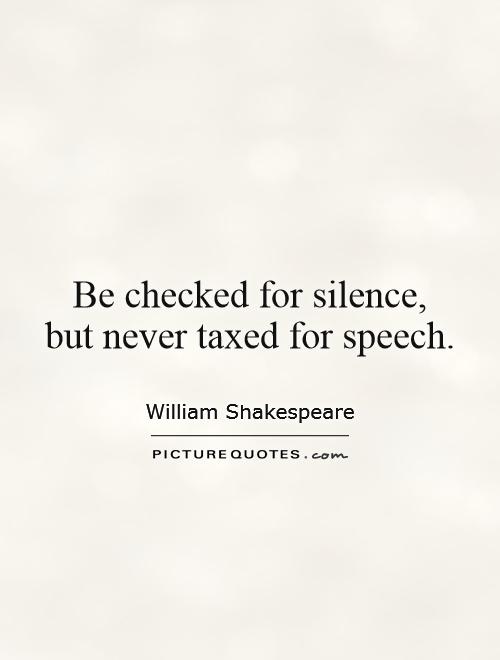Be checked for silence, but never taxed for speech

Be checked for silence, but never taxed for speech
William Shakespeare, the renowned playwright and poet, is often celebrated for his eloquent use of language and his ability to capture the complexities of the human experience in his works. Throughout his plays and sonnets, Shakespeare explores themes of love, power, betrayal, and redemption, all while showcasing his mastery of the English language.One of the most famous quotes attributed to Shakespeare is "Be checked for silence, but never taxed for speech." This line, spoken by the character Polonius in the play Hamlet, is a reflection of the importance of thoughtful communication and the power of words. Polonius advises his son Laertes to think carefully before speaking, to be mindful of the impact his words may have on others, and to always speak with honesty and integrity.
In the context of Shakespeare's own life and work, this quote takes on a deeper meaning. Shakespeare was a master of language, able to craft beautiful and poignant verses that have stood the test of time. His plays are filled with memorable speeches and soliloquies that continue to resonate with audiences centuries after they were written.
However, Shakespeare himself was not immune to the scrutiny and censorship of his time. During the reign of Queen Elizabeth I, the theater was closely monitored by the government, and playwrights had to be careful not to offend the sensibilities of the ruling class. Despite this, Shakespeare managed to navigate these restrictions and create works that challenged societal norms and explored controversial themes.
In many ways, Shakespeare's ability to speak truth to power while also navigating the constraints of his time is a testament to the enduring power of language. His works continue to be studied and performed around the world, reminding us of the importance of free expression and the need to use our words wisely.












 Friendship Quotes
Friendship Quotes Love Quotes
Love Quotes Life Quotes
Life Quotes Funny Quotes
Funny Quotes Motivational Quotes
Motivational Quotes Inspirational Quotes
Inspirational Quotes